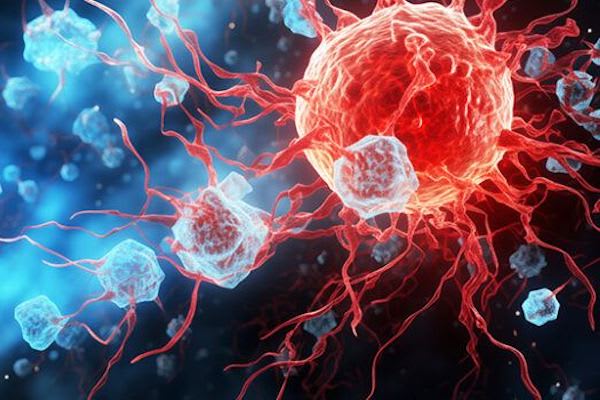
- An international team of investigators, including Providence’s Santosh Kesari, MD, PhD, has achieved a significant breakthrough in glioblastoma treatment.
- Glioblastoma is one of the deadliest types of brain cancer, with a median overall survival for GBM patients is around 15 months.
- The researchers found that a personalized peptide vaccine showed improved survival and strong immune response in glioblastoma patients.
- Findings were published in August 2024 in the high-impact journal Nature Communications.
Four years and two months ago, Mitch Friedman’s Bay Area doctors offered little hope after removing a tumor, known as glioblastoma (GBM), from his brain. But the 65-year-old retired lawyer refused to give up.
A friend introduced him to Providence researcher and neuro-oncologist Santosh Kesari, MD, PhD, head of the Pacific Neuroscience Research Center at Pacific Neuroscience Institute®. Dr. Kesari is a leading international expert in the research and treatment of GBM, one of the deadliest types of brain cancer. Even with aggressive treatment, including surgery, radiation and chemotherapy, the median overall survival for GBM patients is around 15 months. Experts and patients alike recognize the urgent need for new treatment options for this deadly disease.
Friedman is one of many of Dr. Kesari’s patients who traveled to Germany to receive a novel peptide vaccine as part of an international study. Today, he continues traditional treatment with Dr. Kesari, who believes Friedman’s survival is due to the vaccine being administered early after the cancer was diagnosed.
Personalized cancer vaccines offer new hope

In recent years, the cancer treatment landscape has begun shifting toward more personalized approaches. This is important because GBM tumors are heterogeneous, i.e. no two individuals’ tumors are alike. One promising avenue is the development of personalized cancer vaccines that can target the unique mutations within each patient’s tumors. The results of the study that Friedman participated in, published in the August 2024 issue of Nature Communications, offer new hope in this direction. The study presents compelling evidence around the safety and efficacy of a personalized peptide vaccine that could extend survival for some GBM patients.
Read the peer-reviewed manuscript in Nature Communications, or read on for highlights from this research.
What are peptide vaccines?
Peptide vaccines are a novel approach in cancer treatment. Tumor cells have DNA mutations. These encode abnormal amino acid sequences known as neoantigens which become part of the tumor cells allowing them to grow and divide unchecked. Peptide vaccines are developed by identifying these specific DNA mutations within a patient’s tumor, and are designed to trigger a targeted immune response against the tumor cells. The vaccine, customized for each patient, is intended to stimulate the immune system to recognize and attack the cancer cells presenting these neoantigens, thereby killing the cancer cells and shrinking the tumor.
About the study, the largest of its kind to date
The study represents the largest real-world observation to date involving GBM patients treated with a personalized peptide vaccine. Involving 173 patients diagnosed with primary GBM, the study spanned from October 2015 to August 2023. Tumors were analyzed for DNA mutations, and the resulting data were used to create personalized vaccines targeting the identified neoantigens. The median time from tumor tissue acquisition to vaccine administration was 16 weeks, with the vaccine proving to be well-tolerated in most patients.

Source: Nature Communications
Promising results: safety and prolonged survival
The most encouraging finding from the study is that the vaccine-induced activation of neoantigen-specific T-cells was strongly correlated with prolonged on-treatment survival. Patients who developed multiple T-cell responses against the antigens targeted by the vaccine experienced notably longer overall survival (53 months) compared to those with lower or no induced responses (27 months; P = 0.03).
Looking to the future
For patients like Mitch Friedman, these results and his experience translate to more precious time with friends and family in the face of this devastating disease.
While more research is needed, this work adds to the growing body of evidence that personalized cancer vaccines could represent a significant breakthrough in the fight against deadly cancers like glioblastoma.
Related resources
- A real-world observation of patients with glioblastoma treated with a personalized peptide vaccine, Nature Communications
- Brain tumor clinical trials at Pacific Neuroscience Institute
- Video: The Cancer Moonshot with Dr. Kesari
- PNI blog: World’s first GBM vaccine
- Providence Research Network Annual Report























